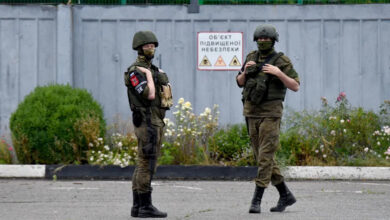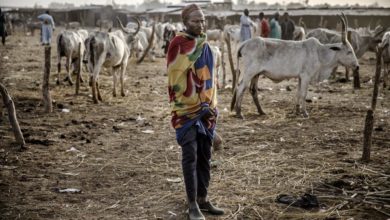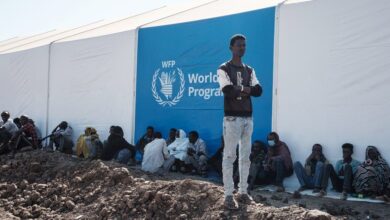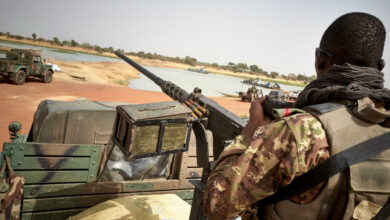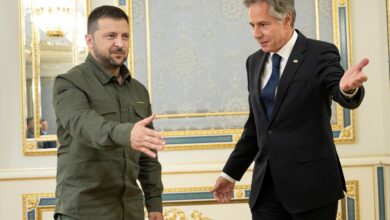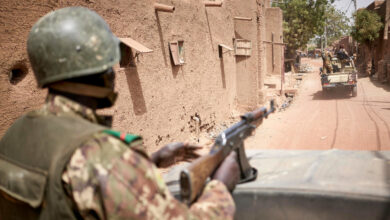Forces loyal to Libyan commander Khalifa Haftar continued their push towards Tripoli on Saturday amid mounting international pressure to halt hostilities which risk plunging the country into civil war.
Haftar ordered the self-styled Libyan National Army to move on Tripoli on Thursday and they were on Saturday battling for control of an area around 50 km (30 miles) south of the capital, AFP reported.
LNA fighters have been slowed in their advance by forces loyal to Libya’s internationally-recognized Government of National Accord, and for the first time, GNA-aligned forces launched air strikes on LNA positions.
Pro-government forces in Tripoli said on Saturday they had targeted Haftar’s forces with “intensive strikes.”
#Libya– following the airstrike, the LNA declared a no-fly zone over the Western Region
— Oded Berkowitz (@Oded121351) April 6, 2019
The LNA media office said strikes were carried out in the Al-Aziziya region by aircraft which had taken off from western Misrata, AFP reported.
The LNA declared a no-fly zone in response.
“Any jet fighter flying over Tripoli will not be allowed and will be targeted, the air base it came from will also be targeted,” Al Jazeera quoted Haftar’s spokesperson Brigadier General Ahmad Al-Mismari as saying.
6th April – Summary of Tripoli clashes:
Fighting remains mainly in the south of TripoliRandom shelling landed in several houses which led to the death of at least 5 civilians in Wadi Alrabi, Q Ben Ghashir & K Firjan
Fresh airstrikes conducted by the GNA in Gharyan & al Gariyat pic.twitter.com/MNBU9i3m3o
— Osama Mansour (@osamammmansour) April 6, 2019
Forces from Misrata are mostly loyal to the GNA, and at least one armed group from the city arrived in eastern Tripoli to join the counter-offensive on Saturday, according to an AFP photographer.
“We are waiting for orders to repel any advance by the enemy towards Tripoli,” the group’s spokesperson Khaled Abu Jazia said.
Dozens of armed vehicles mounted with anti-aircraft guns were gathered in Tajura, in the suburbs east of the capital.
Zintan Military Council sends more than 100 armed vehicles to Tripoli to join forces against eastern invaders as heavy fighting continues in some southern parts of the capital pic.twitter.com/4XVhQ0y0Su
— The Libya Observer (@Lyobserver) April 6, 2019
Interior minister Fathi Bashaga told Alwasat that GNA forces had retaken control of Tripoli’s non-operational international airport, around 25 km from the city, hours after the LNA said they had captured it.
Tripoli residents have expressed concern that large-scale fighting could break out and began stocking up on food and petrol, and large queues formed at petrol stations and supermarkets, an AFP journalist said.
37 dead or wounded in and around #Tripoli due to escalating clashes. #MSF is highly concerned for #Libyan citizens, and #refugees & #migrants trapped in detention centres in conflict areas. People in detention should be immediately transferred or allowed to seek safety elsewhere.
— MSF Sea (@MSF_Sea) April 6, 2019
The LNA said on Wednesday that an operation was being prepared to “liberate the homeland from terrorism,” and later announced that its forces had entered the city of Gharyan, around 80 km (50 miles) south of Tripoli.
On Friday, less than 24 hours after seizing Bridge 27, a key checkpoint 27 km (17 miles) west of Tripoli, dozens of LNA fighters were captured. Blaming a commander, LNA spokesperson Al-Mismari said 128 fighters had been taken prisoner, saying that “the forces captured were not equipped with sufficient weapons or ammunition,” Alwasat reported.
Chairman of Presidential Council inspects Checkpoint 27 in Wershiffana region after a night of chaos that ended with the arrest of more than 100 gunmen loyal to eastern forces led by warlord Khalifa Haftar pic.twitter.com/Ao9A8FAjs7
— The Libya Observer (@Lyobserver) April 5, 2019
UN ‘determined’ for talks
Dozens of militias have fought for control of Libya since a NATO-backed uprising toppled and killed longtime leader Muammar Qaddafi in 2011.
Led by Fayez al-Sarraj and based in Tripoli in the west of the country, the GNA was established in 2015 under a U.N.-led initiative agreed upon by a parallel administration in Tobruk the east, which is supported by Haftar and his LNA.
But the unity government has struggled to assert control and accuses Haftar of wanting to install a military dictatorship.
Sarraj on Saturday accused Haftar of “betraying” him.
“We have extended our hands towards peace but after the aggression that has taken place on the part of forces belonging to Haftar and his declaration of war against our cities and our capital… he will find nothing but strength and firmness,” Sarraj said in a televised speech.
The latest escalation in the conflict-wracked country comes a week before a U.N.-backed conference intended to bring bring together delegates from across the country to draft a political roadmap to unify the country’s institutions and set a date for long-delayed national elections.
U.N. envoy Ghassan Salame insisted the three-day Libyan National Conference would begin “as scheduled” on April 14 in the city of Ghadames.
“We are determined” to hold the talks unless prevented by serious obstacles, Salame told a press conference.
“We want to reassure Libyans that we will stay alongside the Libyan people to make the political process a success without resorting to escalation.”
The international community has called for a halt to hostilities.
France’s foreign minister Jean-Yves Le Drian said “there will be no military victory,” while his German counterpart Heiko Maas said there should be pressure on all the actors in Libya “especially general Haftar.”
Following a closed-door emergency meeting on Friday, U.N. Security Council President Ambassador Christoph Heusgen of Germany said members “expressed deep concern at the military activity near Tripoli which risks Libyan stability and prospects for U.N. mediation and a comprehensive political solution to the crisis.”
During a visit to Cairo, Russia’s Foreign Minister Sergei Lavrov on Saturday called for Libyans to “decide their future themselves” through “inclusive” dialogue “without any sort of artificial dates that some are trying to force upon them from outside.”
In a joint statement released on Thursday, the governments of France, Italy, the United Arab Emirates, the United Kingdom, and the United States said they were “deeply concerned by fighting” and urged all parties to “immediately de-escalate tensions which are hindering prospects for U.N. political mediation.”
With reporting from AFP




